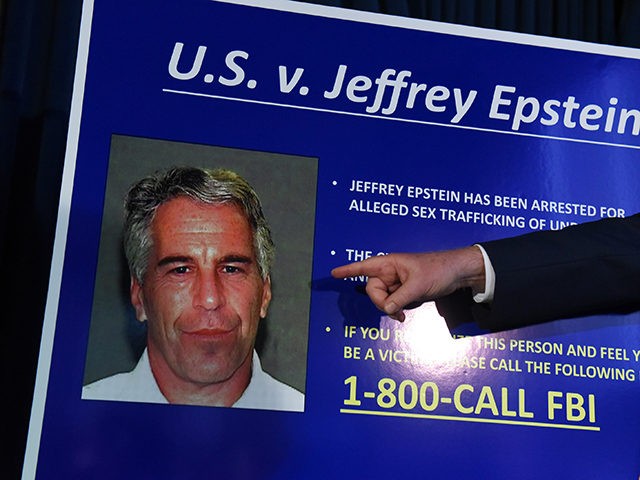A number of media outlets took part in what the New York Times called a “campaign to remake the public image” of Jeffrey Epstein, the billionaire financier who served a short jail sentence for sex offenses after reaching a controversial plea deal in 2008 that allowed him to avoid federal prosecution.
The Times cited Forbes, the National Review, the Huffington Post, and a tech website as outlets that published positive stories about Epstein and noted that those stories were deleted or revised after the newspaper inquired about them.
Forbes published a retraction for a story praising Epstein for his philanthropic spirit headlined: “Science Funder Jeffrey Epstein Launches Radical Emotional Software For The Gaming Industry”:
After review, this post has been removed for failing to meet our editorial standards. We are providing our readers the headline, author and first paragraphs for context only. We regret any inconvenience or confusion.
The Times reported:
The Forbes.com article, posted in 2013, praised him as “one of the largest backers of cutting-edge science around the world” while making no mention of his criminal past. The National Review piece, from the same year, called him “a smart businessman” with a “passion for cutting-edge science.” The HuffPost article, from 2017, credited Mr. Epstein for “taking action to help a number of scientists thrive during the ‘Trump Era’,” a time of “anti-science policies and budget cuts.”
The article on the Forbes website was attributed to Drew Hendricks, a contributing writer. As The Times revealed in an article last week, he was not the author of the piece. Instead, it was delivered to him by a public relations firm, and he said he was paid $600 to attach his byline and post it at forbes.com.
The Times story included a quote from Hendricks, who said he did not know about Epstein’s criminal background.
“All I knew was, this is a guy doing a science thing,” Hendricks said. “If I had known otherwise, I wouldn’t have done it.”
The newspaper also included a quote from Randall Lane, the content officer for Forbes Media. He said “transparency” is the “North Star” for the company and that it had “strengthened” their vetting policy for outside contributors.
The Times article noted that as many as 3,000 such contributions are made to the site on a daily basis.
As for the Huffington Post, the Times reported last year that the website stopped using unpaid contributors and the positive article about Epstein was published in 2017 before the policy changed.
“The byline belonged to Rachel Wolfson, once a frequent contributor to the site who described herself in her author bio as a digital marketer,” the Times reported. “On Friday, HuffPost said in a statement that it had removed the piece ‘at the author’s request.’”
The Times noted that between 2005 and 2018, some 100,000 writers took advantage of the Huffington Post’s “open-door model.”
“Open platforms that once seemed radically democratizing now threaten, with the tsunami of false information we all face daily, to undermine democracy. When everyone has a megaphone, no one can be heard,” Lydia Polgreen, now the editor in chief at the Huff Post wrote, according to the Times.
The National Review also removed the article it published about Epstein, which was written by Christina Galbraith, who described herself as a science writer and said she also had her work published at Forbes and the Huffington Post, the Times reported.
“Ms. Galbraith was also a publicist for Mr. Epstein, according to several news releases promoting Mr. Epstein’s foundations and initiatives in 2012, 2013 and 2014 that included her as a contact,” the Times reported.
“We took down the piece, and regret publishing it,” National Review editor Rich Lowry said in an email and added that they are also improving their vetting process to “weed out such commercially self-interested pieces from lobbyists and PR flacks.”
As Breitbart News reported in February, Google’s CEO confirmed that his company donated money to the National Review Institute, the nonprofit behind National Review.
Lowry defended the company that donated to his publication’s institute without disclosing the donation to readers:
[Sen. Elizabeth Warren] calls out Google for allegedly killing off its competitors by burying them in its searches. It’s not obvious that Google actually does this, although its search business inherently involves constantly making choices to try to best serve what people want to see. No government regulator is going to make Google’s searches better, or is qualified to even try.
The Times also reported that a technology website, The Next Web, controlled by the Financial Times, published an interview with Epstein that did not mention his criminal background or his status as a registered sex offender but corrected “the glaring oversight” and, like the Huffington Post, said the article was published under protocol that is no longer in place.
Follow Penny Starr on Twitter.

COMMENTS
Please let us know if you're having issues with commenting.